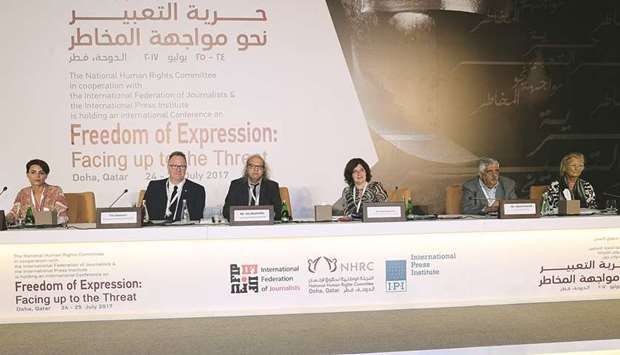Several leading media experts have stressed the need for joint efforts to protect media freedom around the world.
They were speaking yesterday at the plenary session of an international conference on the threats facing freedom of expression, being held in Doha which will conclude today.
Organised by the National Human Rights Committee in collaboration with International Federation of Journalists and International Press Institute, the conference highlights the difficult situations that journalists in many countries face as well as the need for greater efforts to uphold media freedom.
Daoud Kuttab from Community Network, Jordan, noted that media houses must stay united in the face of threats. “Media houses must stay united to protect media freedom, forgetting the differences, if any, when such situations arise. They must show solidarity with other journalists and media houses if they are subjected to unfair treatment by various forces,” he said.
At the same time, he noted that all journalists and media outlets should continue to act professionally as some of them “totally forget the basics of journalism”. Kuttab said that by blocking news items, establishments are punishing the people and it is a violation of the human right to know.
He also pointed out that several countries in the Arab would are facing media restrictions.
Elena Chernievska, representative on freedom of the media at the Office of the Organisation for Security and Co-operation in Europe, contended that arbitrary attempts to restrict media pluralism must be opposed.
Quoting an official on the Ukrainian situation, Chernievska noted: “Media freedom is dependent on a healthy and vibrant and competitive media landscape, which includes voices that provide a variety of news and views in different languages coming from different countries. At all times, and especially in difficult times, blocking is not the answer; more debate is.”
“History has taught us more than once that limits on media freedom for the sake of political expediency leads to censorship and, when begun, censorship never stops,” she added.
Tim Dawson, president of the National Union of Journalists — UK and Ireland, stressed that the free media faces some considerable threats at the moment.
“We need to build more popular concern about freedom of expression and that focus should be woven into everything we do. All who cherish free societies should make it their business to understand the international and national frameworks that underpin unfettered expression.
“Making this concern one of our first reflexes makes the defence of free speech and free expression, something for which we all take responsibility,” he maintained.
“There is also, clearly, a vital role for national governments and legislatures. Not only do they set the legal framework within which all media operates, but they are also able to pressure other countries to act – for which reason I believe that extracting commitments to freedom of expression should be an important condition when negotiating trade relationships and granting foreign aid,” he added.
The session was moderated by Jim Boumelha from the International Federation of Journalists and the panellists included Imen Ladjimi from Article 19 and Dominique Pradalie, chief editor, formerly, of France Television.

The panellists at the plenary session. PICTURE: Thajudheen

